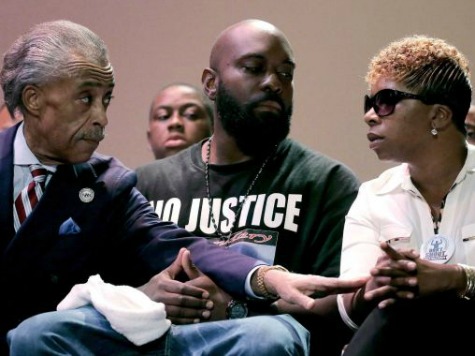On Monday, a Rasmussen poll showed that a full 57 percent of black Americans believe that Officer Darren Wilson ought to be found guilty of murder for his shooting of unarmed 18-year-old black man Michael Brown. Meanwhile, 56 percent of white Americans believe there is not enough information to decide yet.
Clearly, the second position is correct. We simply do not have enough information at this point to determine whether Officer Wilson used excessive force, let alone whether he “executed” Brown, as the Brown family lawyers and Jesse Jackson claim. Wilson has not had a chance to tell his story; the police have not released the full narrative of his side. We do know that original reports that Brown was shot in the back were false; we know that Brown was hardly a “gentle giant” as he was portrayed in the media, given his strong-arm robbery of a convenience store minutes before the shooting; and new reports suggest that Wilson may have been beaten by Brown before the shooting.
But facts are of no relevance to many members of the black community, apparently. In June 2013, a poll showed that a full 86 percent of blacks believe that they do not get equal treatment under the law. Which means that for a huge swath of the black community, every time a black person and a white person are involved in a racial case, knee-jerk support for the black person is merited.
Ferguson is not the first time that huge percentages of the black community have jumped to judgment on racial cases without evidence. Unfortunately, those regular leaps to judgment completely undermine the credibility of legitimate claims regarding racist behavior.
Trayvon Martin. On February 26, 2012, George Zimmerman shot and killed 17-year-old Trayvon Martin after a physical altercation. The police investigated and decided that the shooting was in self-defense. After public pressure, prosecutors brought a murder charge against Zimmerman, despite evidence that Trayvon Martin had been pounding Zimmerman’s head into the pavement when Zimmerman shot him. The media treated Zimmerman as a vicious white killer, despite the fact that Zimmerman was “white Hispanic.” In June 2013, after the not guilty verdict came down for George Zimmerman, a poll of black Americans showed that 86 percent of black Americans said they disapproved of the verdict, and 87 percent said that the shooting was unjustified. Among those number, presumably, we could count President “If I Had a Son, He Would Look Like Trayvon” Obama and Attorney General Eric Holder, who pursued a Department of Justice case against Zimmerman even after the acquittal.
Duke Lacrosse. In 2006, black stripper Crystal Mangum falsely claimed that she had been raped by white members of the Duke lacrosse team. The Duke coach was forced to resign; the players were suspended; prosecutor Mike Nifong brought a case against the players despite countervailing evidence. Eventually, the case fell apart when it turned out that Mangum was lying. Nonetheless, in January 2007, weeks after the case was dropped by Nifong (who was eventually disbarred and convicted of criminal contempt), a CBS poll showed that 46 percent of black Americans thought the Duke lacrosse players were guilty, and 30 percent of black Americans said that race was the “single most important factor in the case,” according to Melissa Harris-Perry.
OJ Simpson. On June 13, 1994, OJ Simpson murdered his ex-wife, Nicole Simpson, and Ronald Goldman. The evidence was clear and convincing, including DNA, blood samples, and shoeprint analysis. Nonetheless, Simpson was acquitted; one of the jurors, gave “what looked like a black power salute” after the verdict was read. In July 1994, 60 percent of blacks said that it was either definitely or probably not true that Simpson had murdered Nicole and Goldman; that number maintained throughout the trial. Even today, 43 percent of blacks agree that OJ was not guilty.
Marion Barry. On January 18, 1990, Washington D.C. mayor and professional race-baiter Marion Barry was arrested after smoking crack in his hotel room. He was caught on video and audio doing so. Nonetheless, a Washington Post poll from February 1990 showed that just 26 percent of blacks thought that Barry was to blame for his arrest; 30 percent of blacks thought he should run again for mayor; 46 percent said they would vote for him if he ran.
Tawana Brawley. In 1987, 15-year-old Tawana Brawley, with the help of race-baiter Al Sharpton, falsely accused several white men, including District Attorney Steven Pagones, of rape. Brawley’s story was false in virtually every way. Nonetheless, a New York Times/CBS News poll in June 1988 showed that just 50 percent of blacks thought Brawley was probably lying, as opposed to 85 percent of whites.
Only a deep-seated belief in the corruption and evil of America’s criminal justice system justifies these numbers. If you believe the system targets black people, then outrage is always justified before the facts are in – and in many cases, even after the facts are in. And the media’s consistent desire to drive that perception continues to contribute to the vast racial gap in American beliefs about law enforcement and criminality.
Ben Shapiro is Senior Editor-At-Large of Breitbart News and author of the new book, The People vs. Barack Obama: The Criminal Case Against The Obama Administration (Threshold Editions, June 10, 2014). He is also Editor-in-Chief of TruthRevolt.org. Follow Ben Shapiro on Twitter @benshapiro.

COMMENTS
Please let us know if you're having issues with commenting.